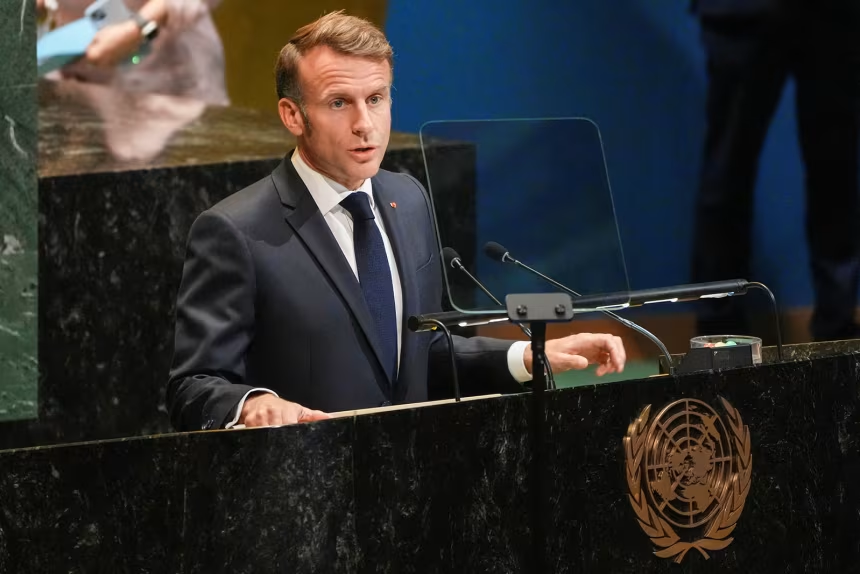World leaders gathered in New York on Monday to show support for Palestinian statehood, despite opposition from Israel and the United States, as the war in Gaza approaches its second year with widespread death, destruction and hunger.
The summit, led by France and Saudi Arabia ahead of the annual U.N. General Assembly, was billed as an urgent attempt to revive the long-stalled vision of a two-state solution to the Israeli-Palestinian conflict. But with Israel intensifying its offensive in Gaza City and expanding settlements in the West Bank, hopes for that outcome appear increasingly remote.
“We must pave the way for peace,” French President Emmanuel Macron said to applause and a standing ovation from the Palestinian delegation. “Today, France recognizes the state of Palestine.” He cited similar or pending recognitions from countries including Britain, Canada, Australia, Portugal, Belgium and others.
Israel’s ambassador to the U.N., Danny Danon, warned that Israel would “take action” in response, though he declined to say whether that meant expanding settlements or annexing territory. He said Prime Minister Benjamin Netanyahu would outline Israel’s position during his upcoming address to the General Assembly and meeting with President Donald Trump.
“A Palestinian state will not be established west of the Jordan River,” Netanyahu said in a statement Sunday.
“Trump opposes recognition of Palestinian statehood”, White House press secretary Karoline Leavitt said Monday, calling it “a reward to Hamas,” whose Oct. 7, 2023, attack on Israel triggered the current war. That attack killed roughly 1,200 people and led to the capture of about 250 hostages, according to Israeli authorities.
Leavitt said Trump believes recognition of Palestinian statehood “does nothing to end this conflict or bring this war to a close” and “does not help free the hostages,” which remains the administration’s top priority.
Palestinian Authority President Mahmoud Abbas, who addressed the summit by video after being denied a U.S. visa, said the authority would govern both the West Bank and Gaza, excluding Hamas from any future role.
“To the people of Israel: Our future and yours depends on peace,” Abbas said. “Enough war.”
Support for Palestinian statehood has grown amid worsening conditions in Gaza. Around 10 countries either formally recognized Palestine over the weekend or said they plan to do so soon. About 150 nations now support Palestinian statehood, with recent shifts in Europe altering the diplomatic landscape.
Britain and France have moved ahead with unilateral recognition, following similar steps last year by Ireland, Norway and Spain. Germany remains a key European holdout.
Japan indicated Monday it is also moving toward recognition. “It is not a matter of if, but when,” Japanese Foreign Minister Iwaya Takeshi said. Representatives from Denmark and the Netherlands made similar statements, saying recognition would come once certain conditions were met.
“We must all open our eyes and see human faces where war has placed the mask of the enemy,” Macron said.
U.N. Secretary-General António Guterres told the gathering that Palestinian statehood is “a right, not a reward,” and warned that denying it could empower extremists worldwide.
While symbolic, the momentum behind statehood could carry practical implications. Some experts say countries recognizing Palestine might face trade or legal restrictions involving Israel to comply with international obligations.
Among the five permanent members of the U.N. Security Council, only the United States now opposes Palestinian statehood — a critical stance, as permanent members hold veto power.
Ahead of the meeting, the General Assembly approved the New York Declaration — a document drafted by France and Saudi Arabia — by a vote of 142-9, with 15 abstentions. The declaration outlines “tangible, time-bound and irreversible steps” toward a two-state solution. It also condemns Hamas’ Oct. 7 attack as well as Israel’s actions in Gaza that have caused widespread civilian suffering.
Despite broad international recognition, the campaign has not succeeded in ending the war or easing Gaza’s humanitarian crisis. The death toll in Gaza has topped 60,000, according to Palestinian authorities, with most of the population displaced.
“No place is safe in Gaza. No one is safe,” Philippe Lazzarini, commissioner general of the U.N. agency for Palestinian refugees, posted recently on social media.
While Trump has expressed discomfort with Israel’s strategy in Gaza, his administration has remained staunchly supportive. During a visit to Israel last week, Secretary of State Marco Rubio downplayed the possibility of a cease-fire deal and backed Netanyahu’s military offensive, despite skepticism from some Israeli military officials.
France Leads Nations into Recognizing Palestinian State
0




